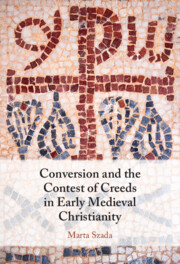Book contents
- Conversion and the Contest of Creeds in Early Medieval Christianity
- Conversion and the Contest of Creeds in Early Medieval Christianity
- Copyright page
- Dedication
- Contents
- Acknowledgements
- Abbreviations
- Introduction
- 1 Religious Controversy and Conversion in Vandal Africa
- 2 Building the Christian Kingdom
- 3 The Vandal Wars and Conversion in East Roman Africa
- 4 Nicene–Homoian Conversion in Ostrogothic Italy
- 5 Nicene–Homoian Conversions in Lombard Italy
- 6 The Religious Controversies in Gaul and Hispania before the Goths
- 7 Family Life and Conversion in Gaul, Hispania, and Italy
- 8 Converting the Kings
- 9 Converting the Kingdom
- Conclusion
- Sources
- References
- Index
Conclusion
Published online by Cambridge University Press: 06 June 2024
- Conversion and the Contest of Creeds in Early Medieval Christianity
- Conversion and the Contest of Creeds in Early Medieval Christianity
- Copyright page
- Dedication
- Contents
- Acknowledgements
- Abbreviations
- Introduction
- 1 Religious Controversy and Conversion in Vandal Africa
- 2 Building the Christian Kingdom
- 3 The Vandal Wars and Conversion in East Roman Africa
- 4 Nicene–Homoian Conversion in Ostrogothic Italy
- 5 Nicene–Homoian Conversions in Lombard Italy
- 6 The Religious Controversies in Gaul and Hispania before the Goths
- 7 Family Life and Conversion in Gaul, Hispania, and Italy
- 8 Converting the Kings
- 9 Converting the Kingdom
- Conclusion
- Sources
- References
- Index
Summary
The book is devoted to the relationships between Nicene and Homoian Christianities in the context of broader religious and social changes in post-Roman societies from the end of the fourth to the seventh century. The main analytical and interpretative tools used in this study are religious conversion and ecclesiastical competition. It examines sources discussing Nicene–Homoian encounters in Vandal Africa, Gothic and Lombard Italy, Gaul, and Hispania – regions where the polities of the Goths, Suevi, Burgundians, and Franks emerged. It explores the extent to which these encounters were shaped by various religious policies and political decisions rooted in narratives of conversion and confessional rivalry. Through this analysis, the aim is to offer a nuanced interpretation of how Christians in the successor kingdoms handled religious dissent and how these actions manifested in social practices.
Keywords
- Type
- Chapter
- Information
- Publisher: Cambridge University PressPrint publication year: 2024

